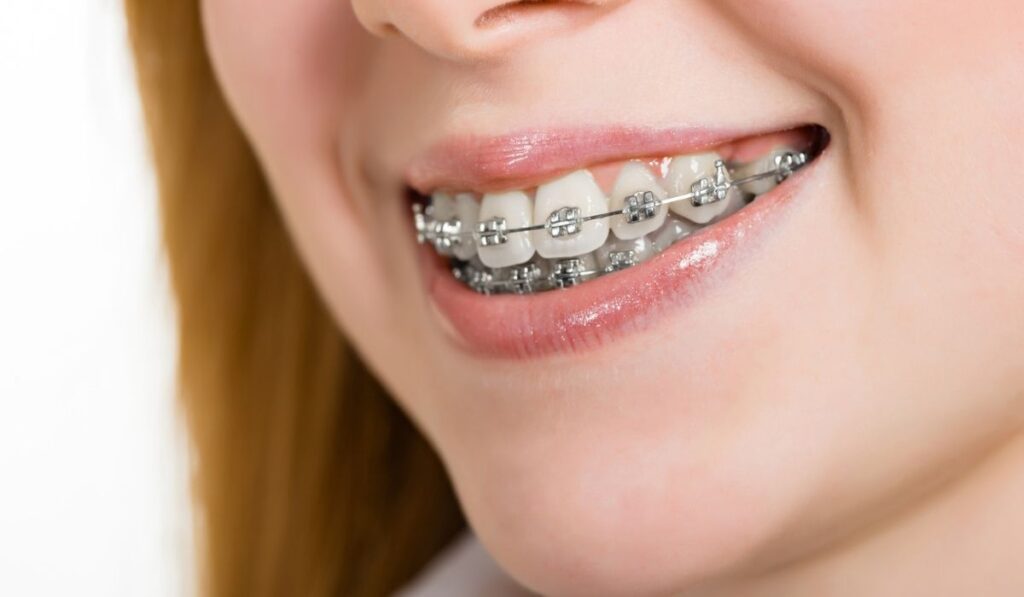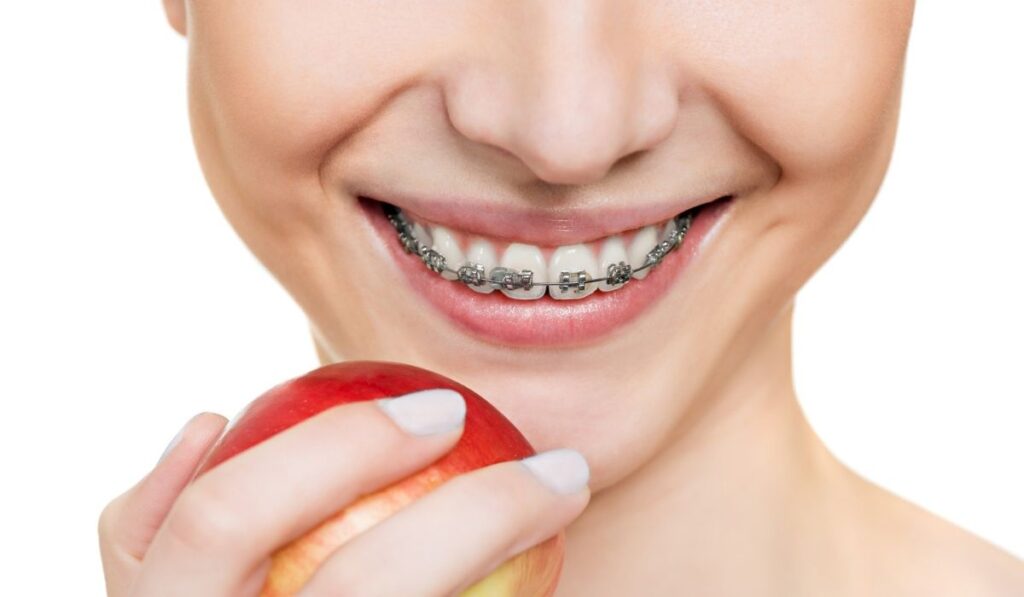An overbite can not only harm someone’s self-esteem and confidence, but it also damages the teeth, gums, and jaw. If left untreated, it can lead to loss of teeth and other irreparable problems. In order to avoid such issues, you should seek an orthodontist’s help for an overbite at the first sign of it.
To fix an overbite, treatments like braces, surgery and extraction extraction, or the use of elastics and springs can all be viable options. Braces can fix an overbite in 8-24 months, depending upon the severity of the overbite. Early treatment has higher chances of achieving long-term success.
Before learning about the treatment options for an overbite, you should know the different types and causes of an overbite. This way, you can identify an overbite at its earliest symptoms and get proper treatment from an orthodontist. So, let’s learn everything about fixing an overbite!
What Is an Overbite?

An overbite is a type of malocclusion in which the top front teeth overlap the bottom front teeth more than normal. In this case, there’s a fair amount of distance between the top and bottom teeth. The teeth are misaligned from their normal position causing problems like gum diseases and tooth decay.
An overbite can be skeletal or dental, meaning it can be because of jawbone irregularity or disrupted dental development. An overbite in some people can be a combination of both.
If the top front teeth overlap the bottom ones more than 2-3 mm, it is a considerable overbite and requires proper treatment.
In severe cases, the lower teeth damage the palate behind the upper teeth. This can lead to loss of upper teeth.
Some people confuse an overbite with an overjet. However, these two terms are different. In an overjet, a horizontal gap is present between the top and bottom teeth. People with considerable overjet are most likely to have an overbite as well.
Overbite Causes
There are multiple reasons for an overbite. It can happen because of genetics or because of unhealthy habits. Let’s take a closer look at some causes of an overbite.
Genetics
Some people have a malformed jaw bone that causes the teeth to develop irregularly. If someone’s jaw is too big or too small, it can cause crowding or spacing between teeth, leading to an overbite.
For some people, uneven jaw bone development runs in the family. You can’t do anything to prevent an overbite if it’s genetic. However, taking treatment on time can prevent problems like tooth loss.
Childhood Habits
Children sucking their thumb or a pacifier consistently past the age of 3 can lead to an overbite. Such habits push the tongue to the back of the top teeth, causing misaligned teeth. There’s repetitive pressure on the roof of the mouth, teeth, and jaw. Sucking on a bottle can have the same effects as well.
Teeth Grinding (Bruxism)
Teeth grinding and clenching (bruxism) is another cause of an overbite. Putting too much force on the teeth overtime can wear away and flatten the front teeth, which can worsen the degree of overbite. If these issues remain unchecked, it can worsen the situation, eventually leading to tooth loss.
Use a dental guard while sleeping at night to prevent teeth grinding. Consider the Oral-B Nighttime Dental Guard (on Amazon).
Nail Biting
Teenagers and adults can develop an overbite if they bite their nails frequently. Nail-biting puts pressure on the teeth, but they aren’t designed to bear this much stress or bite down on hard things like nails. With time, the stress becomes unendurable for the teeth, causing them to wear down and flatten.
Can Braces Fix an Overbite?
Braces are one of the most effective treatment options for an overbite. They can fix most overbite-related problems.
Before starting the treatment, it’s important to assess the relationship between your teeth and jaw. This process involves taking an X-ray of your mouth. After that, your orthodontist will suggest the best treatment option and type of braces for your problem.
Both skeletal and dental overbite can be fixed using braces. The wires straighten the teeth in the first stage. To shift the jaw to its normal position, elastics are preferred in the second stage.
Elastics are made of small rubber bands that are attached to the brackets. They are removable, and you are supposed to take them out while eating, drinking, and brushing your teeth.
Elastics put a lot of pressure on the teeth and jaw, which leads to the treatment of an overbite. However, if you wear elastics on and off, you can worsen your overbite instead of curing it.
There are many types of braces in addition to the traditional metal braces. Ceramic braces with clear brackets are better to use if you feel self-conscious about braces. Most adults prefer ceramic braces now because of their invisibility.
If the overbite is due to excessive jaw issues or extreme crowding, the orthodontist might suggest a tooth removal or surgery for treating an overbite.
What Type of Braces Do You Need for an Overbite?

Most of the time, traditional braces are the best for an overbite. But other things are also required to fix an overbite.
Braces and Elastics
If the overbite is severe, the use of elastics becomes important so that there’s enough pressure on the teeth and the jaw.
The process involves two stages: one for the placement of the metal arch and the second for putting on the elastics.
Your orthodontist will decide how to position the elastics on your teeth according to your misalignment.
Braces and “Herbst” Appliances
Herbst appliances shift the lower jaw forward to fix a skeletal overbite. As the jaw stays in a forward position, the teeth start to move forward as well. However, this treatment is for young children whose jawbones have not properly developed yet. For older patients, this treatment won’t work.
When the Herbst appliance is removed, after about a year, braces are placed on the teeth for a perfectly aligned smile.
Palate Expander
A “palatal expander” or “palate expander” widens the upper jaw and makes more space for the teeth. It is a treatment for crowding of teeth causing an overbite. This treatment is used before the two bones in the upper jaw are fused, which occurs after puberty.
Forsus Springs
Teenagers (older ones) and adults can’t use palatal expanders or Herbst appliances for fixing their overbite. Therefore, a device called forsus springs is used for their treatment.
It’s a spring-shaped tool that is used after braces for about a year. It works similar to elastics, but the chances of fixing the overbite are higher with forsus springs. It puts pressure on the bottom teeth, pushing them forward, while pushing the upper teeth backward.
Tooth Extraction
In severe overbite cases, braces alone can’t align the teeth. Removal of front teeth becomes necessary. Your dentist decides which teeth have to go. After that, the remaining teeth are shifted to get rid of any space between the teeth. Appliances like braces and aligners are used for the shifting.
Surgery
For skeletal overbite, jaw surgery is a great option. It is done after keeping braces for some time. In some cases, the braces might have to stay on even after the jaw surgery. It can take up to 1-2 years to fix an overbite this way.
How Long Does It Take to Fix an Overbite With Braces?
The time to fix an overbite with braces isn’t fixed. It depends upon factors like:
- Overcrowding of teeth
- Type of overbite
- The severity of the overbite
- Jaw problems
- Age of the patient
- Treatment option
- Type of braces
When someone has an overbite, it’s usually accompanied by other problems like crowding and misaligned jaws. Therefore, more than one treatment is usually used to fix an overbite. Sometimes, only braces and elastics are enough while at other times, the patient may require jaw surgery followed by braces.
In general, it can take anywhere from 8 months to 2 years to fix an overbite using different treatments including braces. Elastics are usually kept on for 8-9 months.
The typical healing time for jaw surgery is approximately 12 weeks. Jaw surgery is usually performed after the patient has had braces for about 12-14 months.
In short, the time to fix an overbite with braces and other treatments isn’t fixed. It varies from person to person depending upon their condition. Your orthodontist can guide you better in this regard after deciding on the right treatment for you. Even then, the healing time can change depending upon how your teeth react to the treatment.
What Happens if You Don’t Treat an Overbite?
An overbite is a serious problem that can lead to major issues if left untreated. You should go to a dentist at the first sign of an overbite to save yourself from problems like tooth decay and jaw pain. Here are some of the issues that can result from an overbite.
Gum Damage
If an overbite is left untreated, it can lead to a more-severe overbite, covering the whole bottom teeth. This can put a lot of unbearable pressure and trauma on the gums and surrounding tissues.
In the long run, gum damage will harm your teeth and cause severe pain as well.
Headaches and Earaches
When there is a misalignment of the jaw in an overbite, the muscles and joints connected to it can be affected. These are the ones near your ear and head. This can lead to severe pain and migraines.
Sleep Apnea
While sleeping, an overbite can cause blockage of the airway, leading to sleep apnea. In this condition, breathing becomes hard and snoring increases. In sleep apnea, the patients get disturbed sleep, causing a tiring and lazy day in the morning. Other symptoms of sleep apnea include oxygen deprivation in the brain and gasping for air.
Cavities and Tooth Loss
Having an overbite causes gum damage, which can lead to cavities. If the cavities increase, the patients may lose their teeth. The teeth can wear down quite quickly. Damage to the tissues of the teeth is also expected from an overbite. This damage is irreversible in some cases.
Final Thoughts
Now that you know how braces and other treatments can fix an overbite, you can confidently visit an orthodontist. Having an overbite can affect many other parts of your mouth and cause irreversible damage. Therefore, you should never ignore it.


